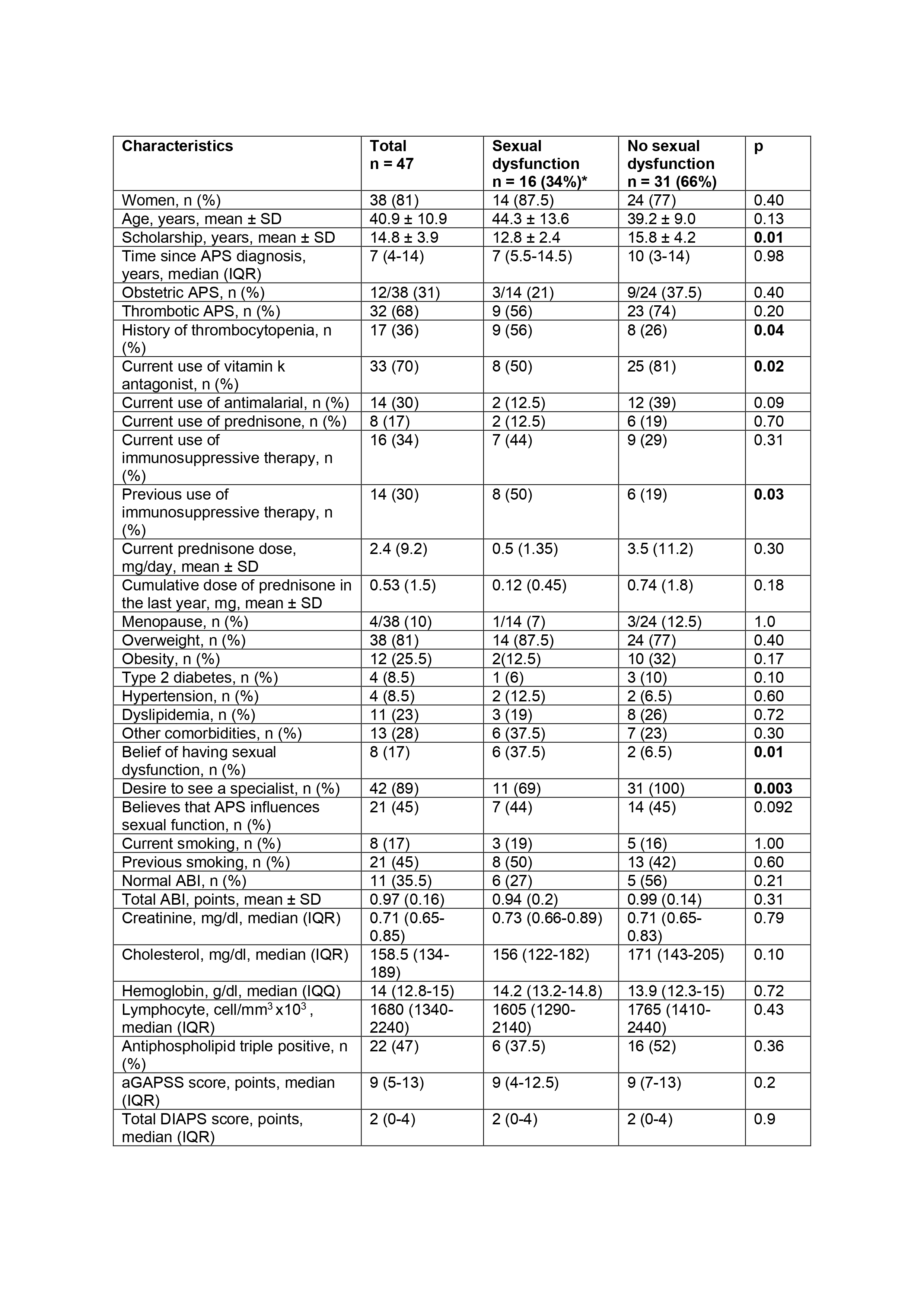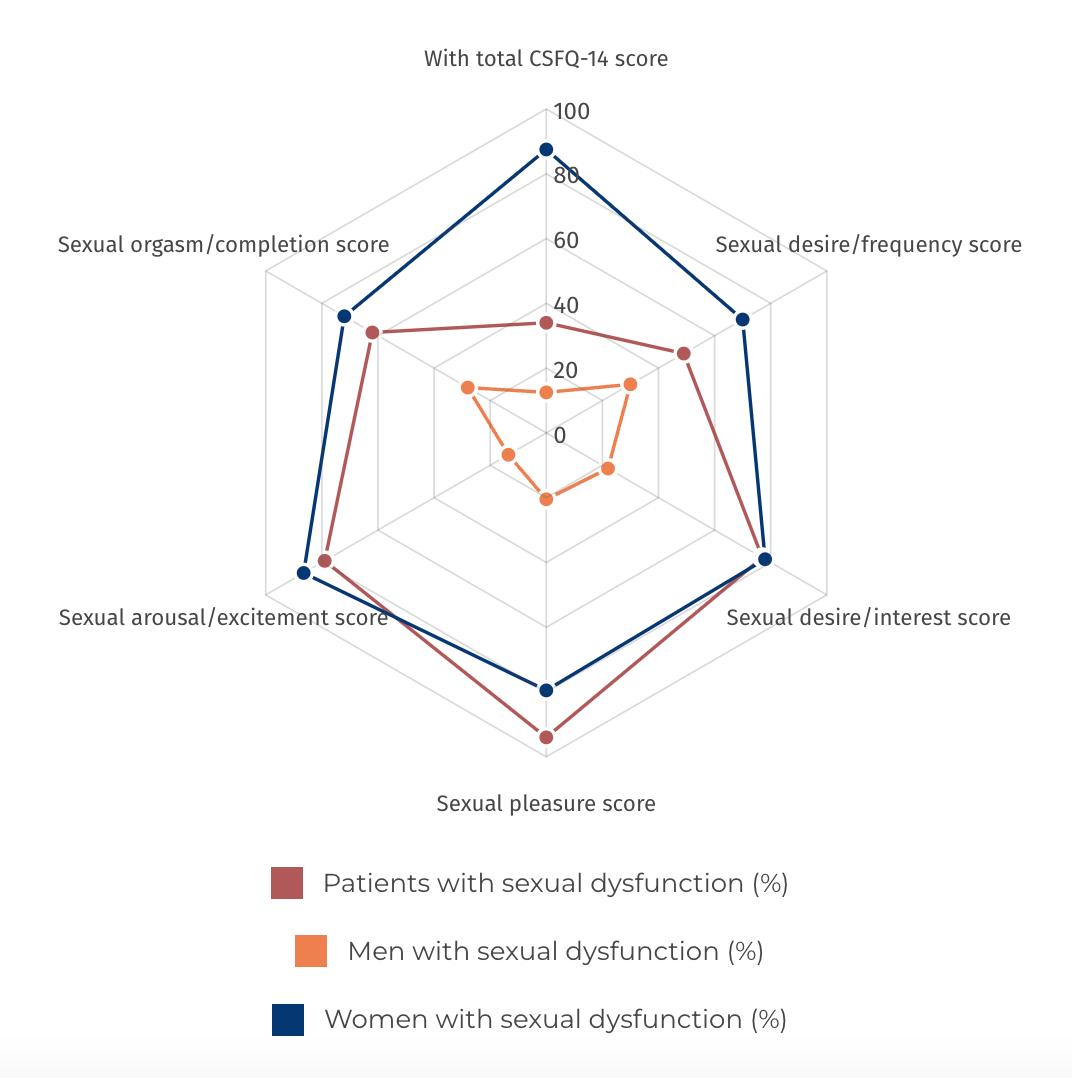Session Information
Session Type: Poster Session A
Session Time: 10:30AM-12:30PM
Background/Purpose: Antiphospholipid syndrome (APS) is a systemic thromboinflammatory disease with various forms of presentation. There is limited information on sexual function in patients with APS, and it is unclear whether it may be associated with chronic disease damage or if other clinical parameters can predict issues in this area of sexual health.
Methods: We conducted a cross-sectional study at two tertiary referral centers in Mexico City and Monterrey from January to May 2024. The study included patients aged ≥16 years who met the revised Sapporo criteria for APS and had been sexually active within the past six months. Patients with other autoimmune diseases, prothrombotic disorders, or chronic viral infections were excluded. All participants completed the Changes in Sexual Functioning Questionnaire-14 (CSFQ-14), which assesses various domains of sexuality, and had their ankle-brachial index (ABI) measured. Additionally, we asked three questions: 1) Do you think you have sexual dysfunction? 2) Would you be interested in being referred to a specialist if you have any alteration in your sexual function? and 3) Do you consider that your illness influences your sexual function? The damage index for patients with thrombotic antiphospholipid syndrome (DIAPS) was calculated, and additional demographic, clinical, and serological variables were recorded.
Results: We included 47 patients with APS, of whom 87.5% were women. The average age was 40.9 ± 10.9 years, with a median disease duration of 7.0 years (IQR 7-14). Thrombotic APS was observed in 68% of the participants. A majority (70%) were on vitamin K antagonists, while 30% were taking hydroxychloroquine. The two primary comorbidities identified were obesity (25.5%) and dyslipidemia (23%). The average cumulative damage score, as measured by DIAPS, was 2, and the mean ABI was 0.97 ± 0.16.
Sexual dysfunction, as assessed by the CSFQ-14 total score, was present in 34% of the patients, with pleasure being the most affected domain (94%). Those with sexual dysfunction had lower levels of education (12.8 vs. 15.8 years, p=0.01), a higher incidence of immunosuppressant use (p=0.03), and a greater likelihood of believing they had sexual dysfunction (p=0.01). However, they were less inclined to seek help from a specialist in sexual function if needed (p=0.003). Gender-specific analysis revealed that more women reported sexual dysfunction in the desire/frequency domain compared to men (70% vs. 30%, p=0.05). Additionally, a correlation was found between the total ABI and both the frequency domain (r=0.31, p=0.03) and the arousal/erection domain (r=0.29, p=0.04). Further details are presented in Table 1 and Figure 1.
Conclusion: This study is the first to outline the prevalence and clinical manifestations of sexual dysfunction in individuals with APS. Sexual function is impaired in these generally young patients who have few comorbidities and low chronic organ damage. Rheumatologists should consider this issue during regular visits and inquire about their patients’ sexual health. Further research is needed to determine the underlying pathophysiological mechanisms of this condition, but endothelial damage and thrombotic alterations may play a role.
*Based on CSFQ_14 total score
Sexual dysfunction was assessed using the CSFQ_14 cut-off points for both the total score and the different domains.
To cite this abstract in AMA style:
Campos-Guzmán J, Espinosa-León M, García Herrera I, Colunga Pedraza I, Martínez-Ruiz M, Barrera-Vargas A, Guaracha Basañez G, Merayo Chalico j. Sexual Health Challenges in Primary Antiphospholipid Syndrome: Exploring Prevalence and Clinical Correlates [abstract]. Arthritis Rheumatol. 2024; 76 (suppl 9). https://acrabstracts.org/abstract/sexual-health-challenges-in-primary-antiphospholipid-syndrome-exploring-prevalence-and-clinical-correlates/. Accessed .« Back to ACR Convergence 2024
ACR Meeting Abstracts - https://acrabstracts.org/abstract/sexual-health-challenges-in-primary-antiphospholipid-syndrome-exploring-prevalence-and-clinical-correlates/


